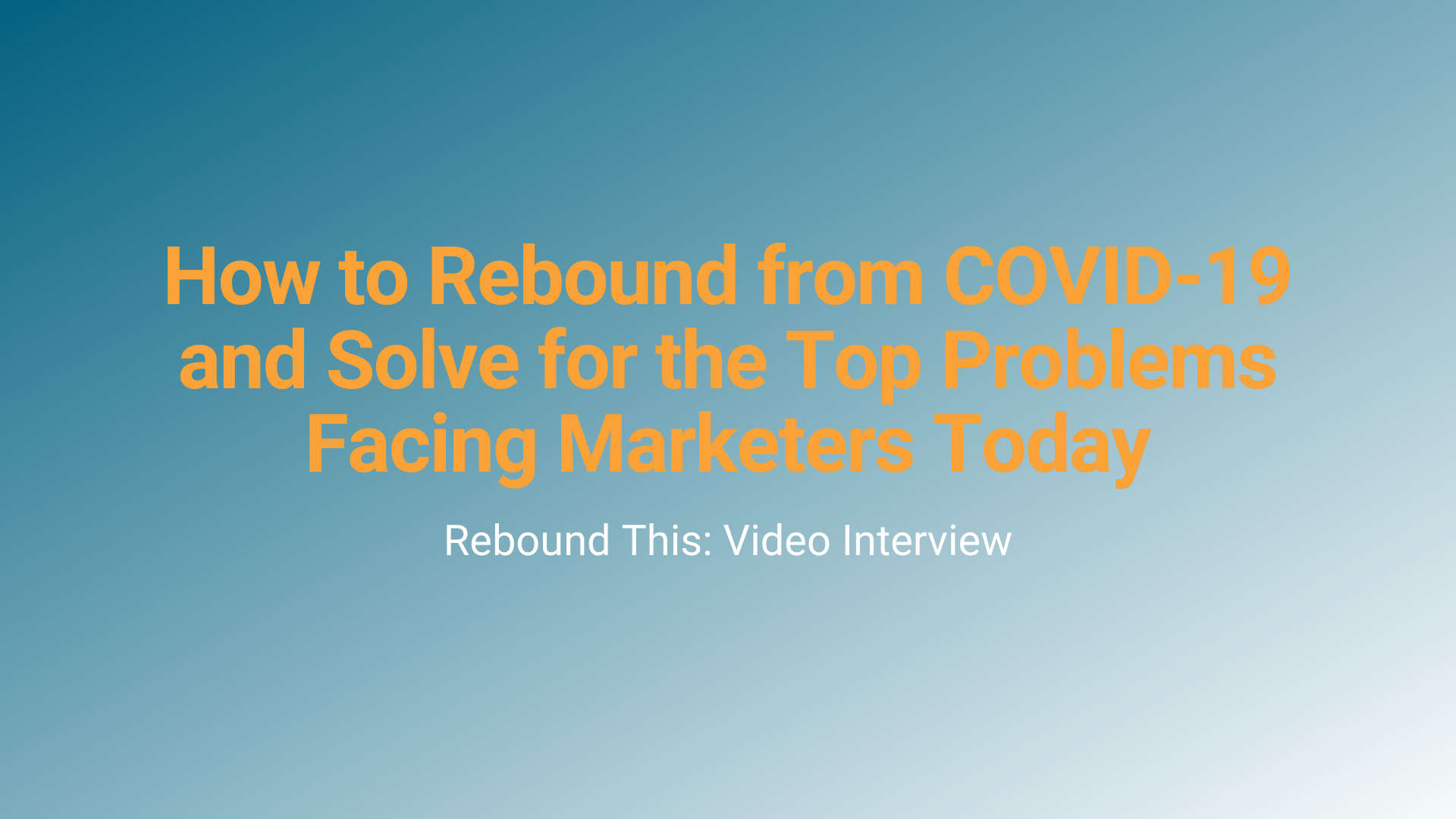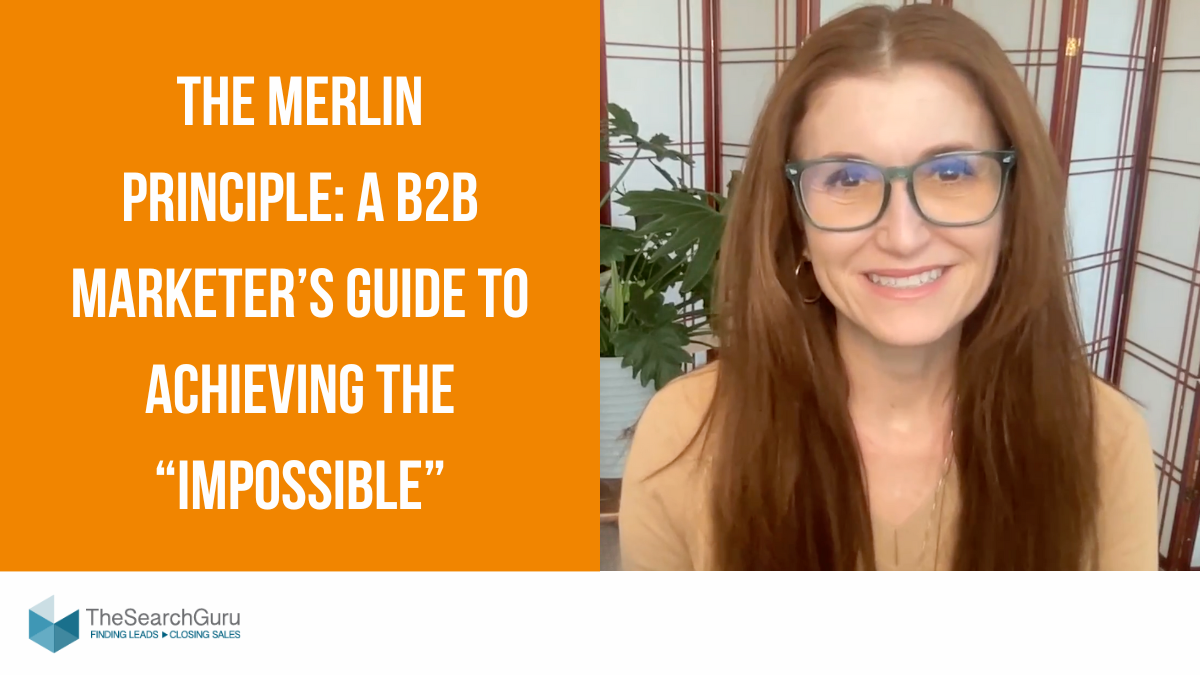Leslie Carruthers: You’re dealing with a combo if not all of the top problems facing content marketers and SEO professionals today:
- lack of resources,
- not being sure what’s producing results and
- time to produce results.
We’re going to talk about how to solve for those problems today inside of COVID-19. And how we’re preparing for the other side, how to prepare for the rebound. I’m so excited.
Tim Kilroy is here with us today. He’s a three time agency owner and now coaches agencies on how to be even more awesome than they already are. His experience is pretty deep and broad. We’re very lucky to have him and get to pick his brain today about ways to get ready for strong recovery. Tim, thanks for being here today.
Tim Kilroy: Yeah, I’m super excited. Let’s dig in. Great because there’s so much to talk about in it.
LC: There is, there is really, really great. So what are you seeing that are positives coming out of the COVID-19 experience with your clients or with your practice?
TK: So everybody’s either more busy or less busy than they were previously.
And if you’re more busy, that’s awesome, right? Because you are now sort of like stress testing yourself and and growing and, you know, you’re sort of gaining, you know, gaining market share and share a voice that you wouldn’t they didn’t have before. So that’s cool. That’s one good thing.
But if you’re less busy, which I would say about half of my clients are less busy. The like, the cool thing is the the ones who were owning this less busy time, are the ones who were sort of investing internally. They’re taking this time to think, “Okay, do we have the right people in the right seats? Do we have the right process? Do we have the right value proposition? Are we anticipating what our clients need or want?”
I think both kinds of companies, the the ones that are more busy than previously and the ones who were investing internally, they’re the ones who are going to rebound the best, the fastest and be better on the other side.
The people who were saying, “You know what, we’re just gonna wait it out or we’ll start when things are more normal will do thing.” I think those are the people are functionally opting to be left behind.
LC: Got it. So a positive of this experience is that if you are slower than you would like to be, you have the opportunity to shore up some weaknesses or create some cool stuff.
TK: Yeah, it’s like, this is your time to sharpen your saw.
LC: Yeah, exactly. And if you decide to pop a squat, you’re probably gonna get left behind.
TK: Exactly, exactly. That’s right. And elegantly put, thank you
LC: So what do you see as possible? Because of this COVID-19 experience, for yourself or for clients, that wouldn’t have been possible without it?
TK: Well, I think there are a couple of things that are pretty remarkable.
Number one, the fact that we can all connect remotely is awesome. You know, you and I’m gonna, obviously gonna, like, push this this beyond what would likely to happen, but, you know, if we can reduce the number of business trips, but still maintain our connections. How fantastic is that? Right, you know, it’s good for the earth. It’s good for your family. It’s good for your communities. Like that’s all great stuff.
Secondly, I think the fact that people are very focused on everyone else. So you see that locally, right? You see where people are, you know, here in my town at six o’clock, everybody like waves up the window window. Neighbor in Boston took us on the chin.
And so that’s cool and people are sharing baked goods of having virtual cocktail hours, you know and so so they are reconnecting to the things that are important to them. You know, because on a on a regular weeknight, you know, we have a giant parcel of kids, you know, we don’t think like, wouldn’t it be nice to touch base with the neighbors or our friends and you know, stop and have a moment. And if we had to bring kids to the here, there and everywhere, we would never think of that so, so we have actually increased the the sort of the density and frequency of our country. Locally, which is pretty amazing. That’s right. And and I think in many respects that’s happening in business too. You know, where, where it’s now okay? To ask your client or your prospect, Hey, how you doing? And we’re just allowed to be more human.
Reach out to People: That’s How the Magic Happens
One of my clients, who’s just a, she’s a terrific agency owner. Her two biggest clients left because they they’re having other business problems. And, and so her revenue dropped like 40% in in a day. And I actually had another client that that her business dropped by 90% in a day. And and both of those agency owners reeled from that. But at the same time, they were able to reach out to people in their networks, saying like, hey, this just happened. How can you know? And is there a way that I can help you help me? Because stuff just happened. That that was beyond my control. And both those agency owners got significant emotional support, great referrals. And, and both of them, one of them is is way beyond their original revenue target. And the other one, the one who lost 90% is now back to about 75% of her previous revenue. And she works in the travel industry, which by the way, she services hotels, cuckoo, where hotels are rocking like they’re they got like 3% occupancy rate in the United States. And her business is now at 75% of where it was before. COVID like, total banana crazy pants stuff and it’s all because it was okay to be human like saying like this happens and “Can someone help?” Do you know anybody and that’s cool. And there I now I don’t know this to be globally true but it feels like there’s a lot less sort of especially in the in the agency agencies base there’s a lot less taking from people and and there’s there’s a much more there’s a bigger sense of, of giving and sharing and being together.
LC: Got it. Great.
TK: Yeah, that’s really great.
LC: And I gotten that from you earlier to when things got when this this ball got rolling and we all kind of got reoriented. I’ve heard you say on a couple of occasions, much fun you’re having serving.
Just Keep Serving
TK: Yeah, I mean, honestly, you know, my business slowed down, right, because agency owners are scared but stay the truth. The fact that I’m able to like jump in and help, huh, is awesome, you know, because all that, like, that’s what you’re supposed to do as a person. But it’s a great power source, isn’t it? And, and it keeps me motivated keeps me on the ball, you know, it doesn’t let it you know, it doesn’t let things fall by the wayside. Because you know, the people that are closest to you in a business sense, those are my clients, like those are the people that matter. And so if I can present myself in a way that where I can be of service, and so I can make their businesses better. You know, it doesn’t mean obviously, everybody wants to get paid, but I know if I make their business better. Eventually they’re going to make my business better.
LC: You got it. Yeah. I hear also you’re saying is springing off some of the best in people. And yeah, candy for connections and networking and being human. That’s Yeah. All right. Really great stuff. Yeah. We wouldn’t have seen it to this degree without the experience right?
TK: Now, on the other hand, I have noticed that some people that I previously had a lot of respect for, have kind of gone like cuckoo banana pants, conspiracy theory stuff, you know, which, which you know all and and that’s less and they’re all doing it sort of in the name of personal exceptionalism, you know, that’s and I found I find that trends to be a little bit sad but but but the vast majority of people I think are, are being better to one another. And I love that.
LC: Really great. So this next question may be something that you’ve already answered from the past but if you want to take a swing at it, kind of in this slightly different take right? You’re welcome to, or just tell me now skip to the next one. What have you or your peers or teams at your organization or in the organizations you’re serving? What have they learned that they wouldn’t have learned or you wouldn’t have learned without the COVID-19 experience?
TK: So two things.
One is every agency leader that I work with, has realized how important their team is. You know, I mean, the best leaders always keep that in mind, but especially for emerging leaders, people who haven’t led for very long or very big teams, they realize how much support they get from their team. And I think many have realized that instead of sort of, that, you know, their job is is is not to sort of put on the hardest and Like the wagon up the hill, which is what they thought they were doing, like, their job is to be like, is to sort of organize everybody and sort of be, you know, lead them, lead them almost from behind, you know, so they’re much more shepherds than commanders. And I think, and I think that, and I think that has been a revelation for many.
Also a sort of a side, a side benefit. I have a couple of clients that have grown, they grew substantially before COVID. And you know, their businesses grew and they added a layer of management. And they’re taking the wise step of taking this time where things are a little bit slower to help that sort of emerging class of leaders. become leaders and learn about managing people and learn about, you know, sort of managing processes. And, and, you know, foresight and insight. And I think and I’m really, really excited about, about the people that have invested in that way. Because, you know, they’ve not just increased the power of that of that person. They’ve increased sort of exponentially the power of their organization by creating people who have autonomy and leadership, you know, underneath the CEO. And that’s, that’s really exciting.
LC: That’s normally not how it goes when someone’s on boarded because there’s a need. Hmm. Right.
TK: Exactly. Exactly. It’s starting a great.
LC: So what about you, Tim, other than serving people, and contributing and sharpening saws, is there anything else that you are doing to prepare for the rebound?
TK: So I’ve created a bunch of content. And so and so in, in a way I’m actually stockpiling content that I can use in you know, for for future engagements and future products and that kind of stuff. So. So that’s, that’s really where I have spent my time. You know, in the, in the short term.
I’m also trying super hard to sort of bring what I do because I’m not cheap. You know, I’m, I’m, you know, but but there are the businesses that can’t afford me. Those are the ones that are most at risk. So, so I’ve actually spent a lot of time sort of reshaping some of my content so it’s appropriate for them. And I’m trying to roll it out, either in free webinars that I’m giving to folks or putting together low cost products so that I can help them help themselves.
LC: Got it. Great. What is surprised you
TK: How it’s okay to be here. Human being, you know, especially in the, you know, in the agency space, there’s a, you know, there’s a veneer of, you know, hair gels and finger guns, right. You know, like, we’re media, we’re technology, we’re cool. You know, and, and stuff suddenly it’s okay to say like, Oh, yeah, yeah, yeah, that is my kid who’s screaming and my dog is barking and yes, I’m wearing the same sweatpants as I did yesterday. And that’s and that’s sort of all okay, so instead of having the veneer of having it all together, you can have the authenticity of being yourself and doing your job. That has really been surprising the fact that it’s, it’s all been okay to to, you know, to it’s it’s all been okay to be yourself nothing and and also wonder, no wonder allowed, you know, because tomorrow and yesterday and today they all sort of blurred together and so it’s, you know, like we’re all living in this world of of, you know, not now, later Now, earlier now, you know, it’s and so I think I think people are more they have the permission to be more present.
LC: Right? Yeah. How are you saying that this has affected the way that the teams at your clients are working?
TK: That’s a little bit uneven, honestly, because because there are there are a lot of folks who have remote teams. And so the impact of the change is different all over the world. So some people are racing ahead, some people are feeling extraordinary stress, and so it has been a little bit uneven. But to go back to the first point, the agency owners that are spending their time sort of investing in Making — sure that the team works together better. I think. I think that sort of team building stuff is really paying benefits not only in preparation for the future, but sort of in collective stress reduction in the now.
Because if you are more connected to and trust your teammates more, things are a little bit easier.
LC: I got that. Nice. With your clients, what impact are you seeing on how they’re selling? Were many of them already selling virtually or were they are they doing the hard stop pivot from face to face selling to now remote selling?
TK: So I would say that that’s most, most of my clients sold mostly remotely anyways, only the biggest, only the biggest clients typically have enough budget to afford to go travel to a destination to make a pitch. That being said, the biggest change that I have seen, and for anybody who’s in the agency space who wants a free tip, for the past, like five years, the only thing that you had to sell is the revenue rocket, hire us 30% better 50% better, we’re amazing, blah, blah, blah. Well, the revenue rocket is not believable right now, because nobody knows what’s going to happen next. And even if you have strong opinions about it, you don’t have any empirical data to say that things are gonna get better or worse anytime soon. So the agency pitch has changed quite a bit from our process ensures that the day before we start working with you was your worst day.
And that we will end up being the the breakwater that protects your downside. And by the way, we also have the opportunity to do this upside because we’ve learned all this stuff during the good times. But fundamentally, our process stops any bleeding. And that has been that has that has been a crucial adjustments that people have have made in their pitch saying that, you know, we can guarantee that the day after we start working, you know, it’s never going to get worse. Got it nice. And that and that by the way harkens back to the sales pitch in in like 2001 which, you know, a sales pitch That an agency I worked with had at that point was, so what’s the worst? What’s your worst performing channel? And they would someone would come up with the answer and say, okay, we guarantee that if you invest in digital marketing it won’t be worse than that. Nice Yep. Right now that wasn’t that that was sort of in the detritus of the.com crash but but you know, but I think you know, similarly like right now it’s we’re protecting you from downside and giving the opportunity for upside. Rather than previously just been like we are the revenue rocket, you know, hire us and, and you know, you can retire six years sooner.
LC: Tim, you’ve seen a few of few crisis situations in your career. You’ve seen the .com bubble. You’ve seen that the 2008 recession 9/11. And now this what was done? What advice do you have for folks for weathering crises, taking advantage of what there is to take advantage of the numb, young prepare for the rebound? Big Picture?
TK: Yeah. So. So my timing, by the way, is is awful because I first started my first agency in 2001. Like that was smart, and then I started my second one in 2008. At it, like, you know, so, so here’s, here’s the thing about uncertainty. uncertainty, is is only replaced by certainty. And so, in order to sell effectively, and to buy effectively, in in times of turmoil, you have to be certain and so it is you cannot Say, like, we’ll we’re going to figure this out together. Like that’s not an effective strategy and in times of turmoil, what isn’t a more effective strategy is, this is what we know to work. We’re going to implement this thing that is rock solid in bulletproof. And once we’re at a point of comfort with that, then we can start experiment about the individual tweaks that we do with you. But there’s got to be the absolute clarity and certainty that there is a plan. And that is crucial. So squishy, plans don’t work. guesses don’t work. What does work is? This is our process. This is why we have it. This is the impact we know we’re going to have. Though you know, those that’s level of certainty. And by the way, that level of certainty cannot be bluster. Right, you have to have, you have to have reasons for this. And and you may not actually you don’t even actually have to have prior results, but you have to have like rock solid reasoning for suggesting this plan and have them in you as the the provider has to have, like 100% belief in what you’re doing. Because you’re gonna it’s got to be authentic and real. Great.
LC: So, Tim, I know you’ve spoken at a few virtual events in the last month, month and a half. What are you think what do you see will stick about virtual events and think about conferences and how many how much bizdev happens? How many relationships are built any insight from your I’ve seen you at a couple at least a couple of online conferences in the last month and a half?
TK: Yeah. So I think I think there will be more online conferences because they are easy and efficient. And they actually have a longer after life than traditional conferences because traditional conferences, don’t record all of the presentations and don’t make them available. And and so for so I think the virtual conferences that have that allowed their content to be made free post the event, I think that will continue to add benefit to the conference and benefit to the presenters and to the audience. So I think I think that will stick the networking, tradeshow booth, that kind of stuff. lead gen stuff. is is is harder, certainly. But I do think that There is an element of it that’s going to stick. So if you go to a sponsored conference, you know, you’re an attendee, then you’re sort of immediately put into, you know, the a warm lead, you know, warm lead flow of one of the sponsors, that happens less at real conferences. And so I do think that in sort of a cost effective lead generation, I feel like virtual conferences are going to are going to have a much higher ROI but at lower scale, but but I do think but but it is unclear to me Actually, it’s very clear to me that a lot of stuff at conferences like sponsoring the cocktail party I think people don’t realize like holy moly, you know, having my name on a banner above summary Bad merleau like is not is is is not is not an effective marketing strategy because it’s noisy and and so I think I think that as as real conferences reemerge in the next year or so, I think they’re going to be more intimate and less CES like, you know, they’re going to be more roundtable real engagements and less 10,000 you know 10,000 booths.
LC: Got it. Great. Is that anything I haven’t asked you that you’d like me to?
TK: I don’t think so.
LC: Great, great. Thank you!






